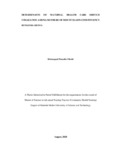| dc.description.abstract | Since independence, the Government of Kenya has made lots of efforts to reduce maternal mortality and morbidity through some women-oriented programs. These programs are included in the marginalized groups like Ogiek in Mt. Elgon Constituency in Bungoma County. Despite this, Mt. Elgon constituency in Bungoma County still had high maternal mortality and morbidity together with low utilization of maternal health care services. Reports showed low levels of skilled delivery in Mt Elgon Constituency (28%) compared to Bungoma County (41%) and nationally (60%) in the year 2015. The study investigated the determinants of maternal health care service utilization among mothers of Mt. Elgon constituency in Bungoma Kenya. Specifically, to determine the client’s characteristics, examine health facility factors, and determine the cultural competence of health care workers and their relationship with maternal health care service utilization in the study area. A descriptive-analytic cross-sectional study was adopted using a mixed method of data collection. A total of 510 respondents were randomly selected using a multistage cluster sampling method and were interviewed from January to March 2019. Data on participant’s characteristics, health facility factors, and cultural competence of health care workers were collected with structured questionnaires. Quantitative data was collected from staff using a self-administered questionnaire while caregivers were interviewed using an interviewer-assisted questionnaire. Cultural competence tool was used to assess health care workers cultural competence. Qualitative data was collected using key informant interviews (KII) and focus group discussion (FGD). Data entry and analysis was done using SPSS version 25 computer software. Both descriptive and inferential statistics were used for analysis. Logistic regression was applied then the odds ratio was used to determine the relationship of variables and a p-value of ≤ 0.05 was considered statistically significant. From the results, the main determinants of maternal health care service utilization were age less than 30 years (p = 0.01), unemployment (p = 0.02), residence less than 6 month old (p= 0.02),working days unsuitable ( p= 0.04), mobile clinic unavailable (p= 0.06), use of interpreter ( p= 0.02), women who were to busy (p= 0.02), consultation of health care workers (p= 0.03), time is taken to hospital/distance (p= 0.007) and the health workers (100%) were culturally incompetent. Overly, Working and having visited the health facility as a patient were found to determine the utilization of maternal health care services. Therefore, there is a need for women’s empowerment by the Government and NGOs, the Ministry of Health at the national and county level to comply with WHO recommendation by constructing health facilities within a 5 km radius, and the Nursing Council of Kenya to incorporate cultural competency training in curriculum due to diversity of culture in Kenya. Further research should be conducted on the quality of care to inform the mitigation factors on having visited a facility as a patient. | en_US |

